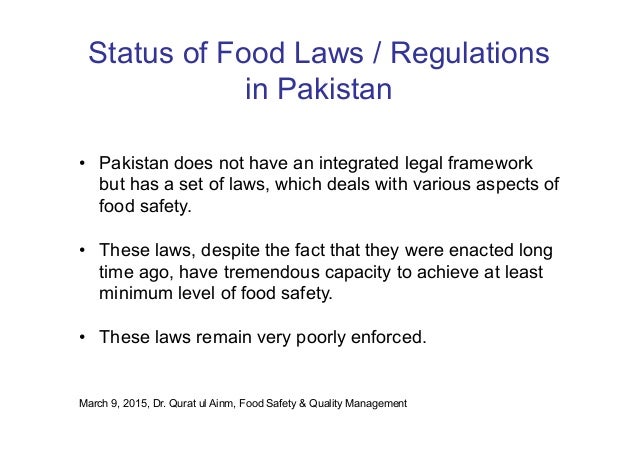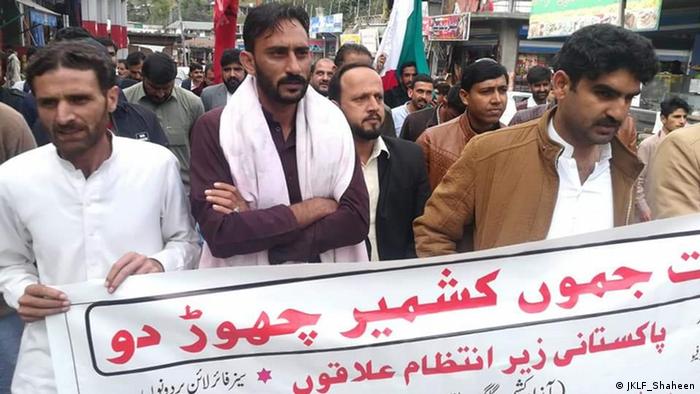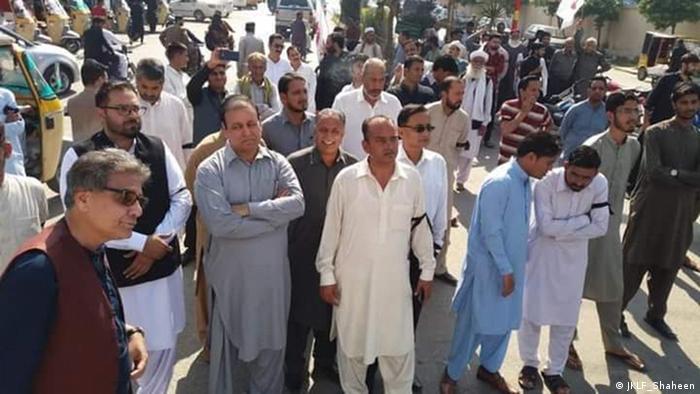M WAQAR..... "A man's ethical behavior should be based effectually on sympathy, education, and social ties; no religious basis is necessary.Man would indeed be in a poor way if he had to be restrained by fear of punishment and hope of reward after death." --Albert Einstein !!! NEWS,ARTICLES,EDITORIALS,MUSIC... Ze chi pe mayeen yum da agha pukhtunistan de.....(Liberal,Progressive,Secular World.)''Secularism is not against religion; it is the message of humanity.'' تل ده وی پثتونستآن
Thursday, February 6, 2020
Food adulteration in Pakistan
Arsim Tariq
The most primary thing for a human is his health, for this is where every dot of his life connects. One would never evoke misery on his life unless it is on purpose, hence it is fair to say that a person would not torment his own health to a dead end.
But unfortunately, this is quite the opposite in Pakistan – predominantly. In my hometown, there is a milk shop, let’s call the owner of that shop with an ‘A’. In recent months, Punjab Food Authority (PFA) sealed A’s shop because of adulterated milk. Notwithstanding the seal, A, remorselessly, continued to sell the milk at the stoop of his shop. Woefully, people of that domain stuck to one’s guns and kept on buying the milk although an official authority of the government sealed the shop. Thus, is it bewildering to state that calling your hatchet man to your threshold is any different from this?
For that matter, there is not much awareness among the public apropos food hazards and its laws and regulations. People incoherently know of the diseases it would cause to their health but they have no certain knowledge of the intensity of the hazards. The low education rate in Pakistan can justify the lack of knowledge among people. According to the Pakistan Bureau of Statistics, only one-third of the population attain primary level education and more than half of the population is unaware of the health diseases. In a report conducted by Health Economics & Outcome Research, fifty-seven percent of the patients who took part in the census lacked a basic understanding of their disease.
No wonder why most people did not take the sealing of that shop as a grave matter and continued taking part in affecting their health. To dig deeper into the repercussions, adulterated milk or food could cause diarrhea, heart issues, peptic ulcer, liver failure, food poisoning, kidney issues, eyesight weakening, cancer, typhoid, hepatitis A, skin disease and disturbed digestive system. Hence, is it iniquitous to say that feeding your child adulterated milk or food is a slow poison rather than giving a boost to his growth?
The unscrupulous food vendors are not a case of one in a hundred in Pakistan, for example, on 11 November 2018, two brothers – Ahmed (one and a half-year-old) and Muhammad (five-year-old) – died of food poisoning after dining previous night before their death. A teenager from Karachi died after digesting a burger she ate at ‘Dil Pasand’. Similar is the case of five children from a single-family, died of food poisoning after having dinner at a restaurant on 22 February 2019. However, A’s shop was unsealed after two days. So, along with the lack of awareness among the public, there is a lack of implementation in law and order. Pakistan is facing a dark hour in this domain for years.
Bad-diet and improper food render frustration and torpidity. Foodborne illness also affects mental health which leads to depression, anxiety, and stress. A person’s health is associated with so many extreme elements. For instance, one’s better health will prevent him from going to the hospitals and buying costly medicines, saving him some bucks – which is a big deal given the inflation rate of Pakistan. Another scenario would be a person’s productivity which is directly proportional to the economic success of the country. If a person is ill – physically or mentally –, he can barely pay attention to his work that will eventually lessen his work productivity. Better health will lead to better growth resulting in efficient productivity. This is not a single person’s tale but a majority’s.
If we dwell into our laws, The Punjab Pure Food Ordinance, 1960s rule 23 states: “A person who sells or offers for sale any adulterated food or food which is not in compliance with the provisions of this Ordinance or the rules shall be liable to imprisonment for a term which may extend to six months but which shall not be less than one month and fine which may extend to one million rupees but which shall not be less than one hundred thousand rupees.”For big fishes, rule 23A reads that whoever manufactures, transports or imports adulterated food “shall be liable to imprisonment for a term which may extend to five years but which shall not be less than six months and fine which may extend to two million rupees but which shall not be less than five hundred thousand rupees.” The same penalties or punishments are enlisted in the 22nd rule of 2011’s ordinance – with no significant amendments.
However, a question comes to mind here – are these rules or laws enough to eradicate the enormous amount of food-grafting across the country?
Adding more to the story of A, the shop was sealed multiple times before and reopened, which is a lucid sign that our law does not seem to eradicate the crisis we are facing. Given the effects a food-manipulator is causing, including deaths, is it not fair to pass an ordinance, as we are passing plenty of them recently, of a death sentence against it? They are the biggest murderers of society as they are killing an enormous population by contaminating the food. Should not they deserve death in return? By death, I mean stringent and prominent punishment – as it is now considered an inhumane punishment by human rights wings.
However, an effective bill is in need by the parliament to cure this deadliest epidemic and is it not their prime duty to pass public-favoring bills instead of immoral hooting in the parliament or putting army shoes on the desk in a talk show? For God’s sake. People are already in agonizing suffering and if the law and its implementation stay as powerless as it is now, more people will die – as it is a slow poison giving rise to a slow death.
Nobel Prize winner Malala’s shooter escapes from prison in Pakistan
It would be a big blow to Pakistan and its campaign to eradicate the remnants of the Taliban if the clip is proved to be authentic.
Ehsanullah Ehsan, the former Pakistan Taliban spokesman who was responsible for the shooting of Malala Yousafzai in 2012 and carrying out the deadly Peshawar Army school terror attack in 2014, has escaped from prison, according to a audio clip released by him.
In the audio clip, which surfaced on social media on Thursday, Ehsan said that he escaped the confinement of Pakistani security agencies on January 11, claiming Pakistani forces failed to keep their promises made to him during his surrender in 2017.
“With the help of God, I succeeded to escape on January 11, 2020 from the confinement of the security forces,” he is heard saying in the clip.
It would be a big blow to Pakistan and its campaign to eradicate the remnants of Taliban if the clip is proved to be authentic.
Without revealing his current location, Ehsan said that he would make a detail statement about the days of his confinement in the coming days as well as about his future plans.
Malala, 22, the youngest Nobel Peace prize winner, was shot by a gunman for campaigning for female education in 2012 in Pakistan’s Swat Valley.
Ehsan was also involved in the one of the most gruesome attacks on children anywhere in the world when 8-10 suicide attackers wearing paramilitary Frontier Corps uniforms on December 16, 2014 entered the Peshawar’s Army Public School and went from classroom-to-classroom shooting indiscriminately, killing 149 people including 132 students.
Ehsan in the audio clip said that he surrendered to the Pakistani security agencies on February 5, 2017 under an agreement but the forces failed to keep their promise made before the surrender.
“I followed the agreement for about three years. But these shrewd security institutions put me in prison along with my children in violation of the agreement,” he said, adding that he finally decided to flee from the for
ces. The authenticity of the audio and veracity of the Ehsan’s claim was not verified by the security forces or the Pakistani government.
https://www.hindustantimes.com/world-news/lifer-for-bangladeshi-who-killed-family-in-uk-lived-illegally-in-india/story-7pe9golp29TBBAO2QcTWUL.html
Will India airlift Pakistani students from Wuhan? Here's what government has to say
Ministry of External Affairs has said that India can consider evacuating Pakistani students from China, if Imran Khan government makes a request.hen India evacuated its students from the epicentre of deadly coronavirus in China's Wuhan, the internet was left heart-broken by something else. As Indian students, most studying medicine, boarded the buses sent by the Indian embassy to leave, Pakistani students made videos and posted on social media.
In their emotional messages, they denounced their government and hailed India. Imran Khan-led Pakistani government has chosen not to evacuate its students from the country which has, by Thursday, registered over 28000 confirmed cases and at least 560 deaths.
Soon, the din on social media grew to request Indian authorities to evacuate Pakistani students as well. The Indian government has responded. Ministry of External Affairs has said that India can consider it if Imran Khan government makes a request.
Pakistani student in Wuhan shows how Indian students are being evacuated by their govt. While Pakistanis are left there to die by the govt of Pakistan:
8,207 people are talking about this
On being asked if the government is planning to help Pakistani students who have been left behind their country in coronavirus-stricken Wuhan in China, MEA spokesperson Raveesh Kumar on Thursday said that for now, the Pakistan government has not made any such request.
"But if such a situation arises and we have resources available, then we will surely think about it," Raveesh Kumar said.
Chinese health authorities reported 563 deaths and another sharp jump in the number of confirmed cases to 28,018. Outside mainland China, at least 260 cases have been confirmed, including two deaths in Hong Kong and the Philippines.
Imran Khan has said that his government will not evacuate Pakistani students in solidarity with Beijing after an official statement from Chinese authorities called other countries 'mean' for imposing travel bans in view of the virus.
MEA Raveesh Kumar told media in a presser that all 645 people evacuated via two Air India flights last week have tested negative for the virus. The evacuees, which also included seven Maldivians, were kept in isolation at Army Base and ITBP camps.
In a separate statement, the Union Health Ministry said that India has not reported any new cases of the deadly virus.
It said that as of February 6, 1,38,750 passengers from 1,265 flights had been screened for novel coronavirus illness but no new case was detected.
India has so far reported three confirmed cases of nCoV from Kerala. Three medical students studying at the Wuhan University who returned to India recently tested positive for the virus.
Besides, 510 samples were tested by ICMR network laboratories, of which all had tested negative except for the three already reported positive cases.
The three cases are clinically stable, the ministry said in a statement.
It said that all 645 people evacuated from Wuhan, who were kept in isolation at Army Base and ITBP camps, tested negative for coronavirus.
Community surveillance and contact tracing is going on by IDSP for 6,558 persons across 32 states/UTs.
The Fourth Joint Monitoring Group (JMG) meeting was held on Thursday under the Directorate General of Health Services (DGHS) to discuss various technical issues, including the review period of follow up required for asymptomatic travellers from China.
The Health Ministry in coordination with central ministries and all states/UTs is taking adequate measures for the management of nCoV in India.
یوم کشمیر: کشمیری قوم پرستوں کی طرف سے مخالفت کیوں؟
پاکستان کے زیر اتنظام کشمیر میں قوم پرست جماعتوں کا کہنا ہے کہ اگر پاکستان واقعی کشمیریوں سے یکجہتی دکھانا چاہتا ہے، تو اسے پہلے اپنے زیر انتظام کشمیر اور گلگت بلتستان کو حقوق دینے چاہئیں۔
پاکستان اور اس کے زیر انتظام کشمیر میں پانچ فروری سرکاری سطح پر یوم یکجہتی کشمیر منایا جاتا ہے اور اس سلسلے میں بدھ کو بھی سیاسی اجتماعات منعقد کیے گئے۔
لیکن جموں کشمیر کی خودمختاری پر یقین رکھنے والی قوم پرست جماعتیں اس یوم یکجہتی کو شک کی نظر سے دیکھتی ہیں۔ ان کا کہنا ہے کہ پاکستان کی طرف سے 'یوم کشمیر' منانے سے کشمیریوں کی کوئی خدمت نہیں ہوتی بلکہ ان کی جدوجہد آزادی کو نقصان پہنچتا ہے۔
جموں کشمیر لبریشن فرنٹ کے صدر توقیر گیلانی کا کہنا ہے کہ بھارت کا پہلے ہی دعوی ہے کہ کشمیر کے عسکریت پسندوں کو پاکستان کی حمایت حاصل ہے۔
انہوں کہا کہ، "اس طرح کے پروگراموں کو بھارت پروپینگڈے کے طور پر استعمال کرتا ہے۔ آج کے دن انہوں نے یاسین ملک اور کشمیری عسکریت پسندوں کی تصویریں ایک ساتھ لگا دی ہیں، جس سے جے کے ایل ایف کے ان کارکنان کو شدید نقصان پہنچ سکتا ہے، جو بھارتی مقبوضہ کشمیر میں آزادی کی جدوجہد کر رہے ہیں۔ ہم نہ عسکریت پسندی میں یقین رکھتے ہیں اور نہ آزادی کے لیے مذہبی کارڈ استعمال کرنے کی حمایت کرتے ہیں۔ ہماری جدوجہد سیکولر ہے، جس کا حصہ مسلمان، ہندو، سکھ اور ہر طرح کا کشمیری ہو سکتا ہے۔"
توقیر گیلانی کا کہنا ہے کہ اگر پاکستان واقعی کشمیریوں سے یکجہتی دکھانا چاہتا ہے، تو وہ اپنے زیر انتظام کشمیر اور گلگت بلتستان کو آزادی دے۔ ہمیں اسلام آباد میں سفارت خانہ کھولنے دے اور ہمیں سفارتی لڑائی لڑنے دے۔ ہمیں صرف پاکستان کی اخلاقی اور سفارتی مدد چاہیے۔ اس اقدام سے بھارت پر بھی دباؤ بڑھے گا کہ وہ مقبوضہ کشمیر کو خالی کرے۔"
تاہم جماعت اسلامی کے سابق امیر قاضی حسین احمد کی صاحبزادی اور سابق ایم این راحیلہ قاضی قوم پرستوں کا کہنا ہے کہ، "میرے والد کو یہ اعزاز حاصل تھا کہ انہوں نے یہ دن شروع کیا تھا۔ افغان جہاد کی کامیابی سے کشمیریوں میں بھی جذبہ حریت بیدار ہوا۔ انہوں نے دیکھا کہ جب ایک چھوٹی سے قوم سوویت یونین کو شکست دے سکتی ہے تو وہ بھی اپنی آزادی حاصل کر سکتے ہیں۔ ان کی جدوجہد کو بھارت نے بے دری سے کچلا، جسکی وجہ سے کچھ کشمیری نوجوانوں نے پاکستان میں پناہ لی اور جماعت اسلامی نے ان کی اخلاقی مدد کی اور آج بھی ہم یہ چاہتے ہیں کہ کشمیریوں کو حق خودارادیت ملے اور یوم یکجہتی کشمیر سے اس حق کی راہ ہموار ہوگی۔"
لیکن پاکستان کے زیر اتنظام کشمیر کی سیاسی جماعت جموں کشمیر پیپلز نیشنل پارٹی کے چیئرمین ذوالفقار احمد ایڈوکیٹ یوم یکجہتی کو 'فراڈ' قرار دیتے ہیں۔
"یہ یکجہتی کےنام پر سب سے بڑا جھوٹ ہے۔ بھارت اور پاکستان دونوں کشمیریوں کے علاقوں پر قابض ہیں۔ اسلام آباد نے اقوام متحدہ سے وعدہ کیا تھا کہ وہ اپنی فوجیں کشمیر اور گلگت بلتستان سے نکالے گا۔ انہوں نے اپنی فوجیں آج تک نہیں نکالیں، یہ کیا کشمیریوں سے اظہا یکجہتی کریں گے۔"
ان کا کہنا ہے کہ یہ دن کشمیریوں کی سیکولر جدوجہد کو چھپانے کے لیے شروع کیا گیا تھا۔ "اسی کی دہائی میں نیشنل اسٹوڈینٹس فیڈریشن نے کشمیر کی خودمختاری کے لیے جدوجہد شروع کی تھی، جس سے کشمیریوں کو دنیا بھر میں پذیرائی مل رہی تھی۔ پھر جماعت اسلامی نے اس جدوجہد کو نقصان پہنچانے کے لیے اس دن کو منانا شروع کیا، جس کا مقصد کشمیریوں کو مذہبی اور فرقہ وارانہ بنیادوں پر تقسیم کرنا تھا اور پورے کشمیر کو چھوڑ کر صرف وادی پر بات کرنا تھا۔ اس لیے ہم اس دن کو نہیں مانتے۔"
کشمیریوں دانشوروں کا خیال ہے کہ جب تک پاکستان کشمیری قوم پرستوں کے موقف کو مانتے ہوئے خود مختاری کی حمایت نہیں کرتا، کشمیری قوم پرست تنظیمیں کبھی بھی اسلام آباد کی حمایت نہیں کریں گی۔
اس کی بنیادی وجہ کیا ہے؟ معروف کشمیری دانشور پروفیسر خلیق احمد کے مطابق، " پاکستان چاہتا ہے کہ کشمیر کا پاکستان سے الحاق کر دیا جائے لیکن کشمیری قوم پرست تنظیمیں نہ پاکستان کے ساتھ رہنا چاہتی ہیں اور نہ بھارت کے ساتھ بلکہ وہ خود مختاری چاہتی ہیں۔"
Pakistanis have nothing to celebrate on Kashmir Solidarity Day except discounts on clothes
NAILA INAYAT
The real winner of the Kashmir Solidarity Day is the common Pakistani who sees this day for what it is. A holiday in the middle of the week.Another 5 February has passed and Kashmir nahin bana Pakistan. Kashmir Day is a national holiday in Pakistan meant for expressing solidarity with Kashmiris. Amid aggressive speeches, rhetorical statements by ministers, some new songs and threatening tweets, this Kashmir Day passed with only one reiteration: “Kashmir se humara rishta kya, la ilaha illallah”. Yawn.
Ever since the Narendra Modi government diluted Article 370 stripping Jammu and Kashmir of its special status, every day in Pakistan has been a Kashmir Solidarity Day.
What began originally as a call for strike to show solidarity with Kashmiris in 1975 by then-Pakistan Prime Minister Zulfikar Ali Bhutto was in 1994 recycled into Kashmir Solidarity Day, an official public holiday by the Benazir Bhutto government.
How many days in a year are enough to show support? In Pakistan’s case, the more, the merrier. That’s why 2019 was a combination of black days and half-hour long solidarity days, when we all stood for thirty minutes one Friday from 12 to 12.30 pm. It all seems like yesterday. But then the new decade’s first Kashmir Day promised to be different, only that it wasn’t.
Prime Minister Imran Khan appealed to all Pakistanis last month, at home or abroad, to come out of their homes in support of the eight million Kashmiris who have been besieged by nine lakh Indian Army soldiers for almost six months by the “fascist“ Modi regime. Now, if getting out of our houses will get us Kashmir, I promise you PM Khan that I won’t return to my house till the next Kashmir Solidarity Day in 2021. But this is how far Pakistan has reached every 5 February.
What won’t free Kashmir
Pakistan’s diplomatic failure after the Article 370 move is evident in how only three other countries — Turkey, China and Malaysia — raised concerns over India’s Kashmir move at the United Nations last year.
Malaysian Prime Minister Mahathir Mohamad had to pay a hefty price for criticising Modi because India last month restricted palm oil exports from Malaysia. In December 2019, PM Imran Khan had skipped the Islamic conference in Kuala Lumpur despite PM Mohamad sending him an invitation. Poetic injustice. However, now PM Khan has not only vowed to flood Pakistan with palm oil from Malaysia to compensate for India’s trade snub to the country but has also expressed hope that he will be able to attend the next Kuala Lumpur Summit. But will he still be the prime minister then? We can’t promise.
For Pakistan, all doesn’t seem well on the Muslim ummah front either. The PM is now shifting the blame of his diplomatic failure onto the Organisation of Islamic Cooperation (OIC) for not being more critical of India on the Kashmir issue. While this criticism is coming not only from Pakistan’s government but also the country’s opposition leaders. They feel Pakistan has been wronged by the OIC for not calling a special session on Kashmir since the 5 August 2019 decision. Pakistan Muslim League-Nawaz leader Khawaja Asif called the 57-nation bloc a “dead horse”.
But ‘Kashmir banega Pakistan’.
After devoting two parliamentary days for debating the Kashmir issue, Pakistan’s National Assembly and the Senate passed resolutions condemning the Indian security forces for committing atrocities against the people in the Valley. But one should give credit where credit is due: Pakistan’s legislators didn’t take this much time to pass three bills last month that extended army chief General Qamar Javed Bajwa’s tenure by three more years. In a deserted National Assembly session Tuesday, several ministers made fiery speeches, threatening PM Modi if he dared to even think of attacking Pakistan. Regardless, even if few people sitting next to them weren’t listening. Whatever their portfolios, all ministers in Pakistan are Kashmir ministers first and the rest afterwards.
The production of new Kashmir Day songs by the Inter-Services Public Relations wing of the Pakistan military and Pakistan Tehreek-e-Insaf has definitely put the enemy in a tizzy. If singing “Kashmir hoon main, shehrag Pakistan ki” or “Aey mere Kashmir Inshallah, tujhe azad kara le gaye Inshallah” won’t free Kashmir, wonder what will. The second bet is Federal Minister for Kashmir Affairs Ali Amin Gandapur’s huge billboards in Islamabad celebrating Kashmir Day.
The real winner
Year after year, the day is celebrated or observed with no “moment of silence” but the reassurance that Kashmir is our jugular vein and that it will become Pakistan one day. So much of the same thing has only numbed us.
The real winner of the Kashmir Solidarity Day is the common Pakistani who sees this day for what it is. A holiday in the middle of the week, a day to freely eat, sleep and maybe get bombarded with “free Kashmir” messages. But not all messaging is bad because Kashmir Day sales in home and clothing outlets are a thing now. So, what if you didn’t get Kashmir? You got a holiday nevertheless.







